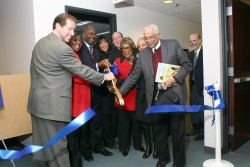 Left to right: David Maxwell, president of Drake University; Vicky Long-Hill, president of the Iowa NBA; Linnes Finney Jr., president of the NBA; Vanita Banks, president-elect of the NBA; David Walker, dean of Drake Law School; Cleota Proctor Wilbekin, LA |
At the Feb. 1 dedication of the transfer of National Bar Association archives to the Opperman Law Library, William S. Morris, the grandson of NBA co-founder James B. Morris, described the racial tensions in Des Moines during the 1920s. He cited appalling examples, such as when the local chapter of the Ku Klux Klan burned a cross at the foot of the Iowa State Capitol building in 1925.
“The Klan was at the height of its power,” Morris said. “Racial intolerance was ripe — there was anti-immigrant sentiment; there was anti-Communist sentiment; there was anti-black sentiment, and Iowa was no different from the rest of the nation.
“These black men and women took a stand when it was not only legally dangerous, but physically dangerous to so. Black lawyers were often challenged in the courtroom to produce their credentials…white judges couldn’t believe there were black lawyers.”
The dedication commemorated the pioneering civil rights work of five African-American lawyers — S. Joe Brown, Charles Preston Howard, LW’20, Morris, Gertrude Rush and George Woodson, plus seven other lawyers — who co-founded the NBA in 1925 in Des Moines. The NBA was established because the American Bar Association did not accept African-American lawyers as members at that time. Today, the NBA network encompasses more than 40,000 African-American judges, lawyers, educators and law students.
The NBA archives were formerly located at the Des Moines Public Library, where members of the public could request files from the archive. Now, citizens can meet and explore the files in a newly-built room in Opperman Hall. The archive includes biographical information, news clippings and photos of the association’s founding members, as well as meeting agendas and other files from NBA annual meetings since the early 1980s.
Documents from the 1940s demonstrate the uneasy political and social status of African-Americans. One magazine cites a speech by NBA co-founder Joe Brown in which Brown speaks out against a proposed ban on interracial marriage in Iowa. Brown, a major crusader for African-American rights, opposed the ban on the grounds that it would set a precedent for “Jim Crow” laws in Iowa.
Also of particular interest are hundreds of pages of files from the FBI’s McCarthy-era investigation into the Communist activities of NBA co-founder and Drake alumnus Charles Preston Howard. The NBA archive offers an in-depth look into Howard’s life and death, including his studies and athletic career at Drake. Howard may have been the University’s first black athlete and letter recipient, according to Drake athletic historian Paul Morrison. Archive materials track his career as a lawyer, crusade for freedom of speech and political belief, and subjection to FBI investigation.
Prior to the FBI investigation, Howard was disbarred from the Polk County courts. The NBA appealed for posthumous reinstatement of his law license in 1990, years after his death. Drake’s NBA archive contains the lengthy appeal document, statement of case and applicant’s brief, as well as dozens of letters in support of his reinstatement, including those from lawyers, state representatives, and Iowa Sen. Tom Harkin. The courts held that Howard’s legal “contributions were indeed outstanding,” but denied the NBA’s appeal because complaints about Howard’s practices had been numerous even before the FBI investigation.
Coinciding with the first day of Black History Month, the NBA dedication at Drake hosted Morris as a distinguished guest among a lineup that also included Linnes Finney Jr., president of the NBA, Drake University President David Maxwell; Law School Dean Walker; Romonda Belcher-Ford, LW’95; John Brittain, chief counsel of the Lawyers Committee for Civil Rights Under Law; Elaine Estes, BN’53, former director of the Des Moines Public Library; Dr. Lawrence Howard, son of Charles Preston Howard; Judge Odell McGhee, LW’77, and Robert Wright Sr., LW’54, an active member in the NBA as well as the NAACP.

